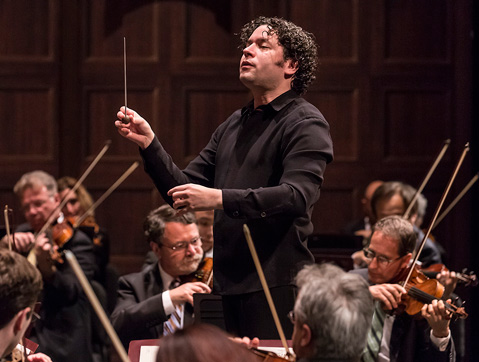Review: L.A. Phil
Emanuel Ax Plays Brahms and More

It’s always a festive atmosphere when the Los Angeles Philharmonic makes its annual pilgrimage to Santa Barbara, and this late afternoon concert at the Granada on Sunday, May 4, was no exception. Clad in everything from their best Easter suits to jeans and T-shirts, classical music fans jammed into every available seat in anticipation of another spectacular performance by maestro Gustavo Dudamel and his orchestra.
The pleasant surprise on this particular occasion was not, however, the overwhelming command of the world’s most popular symphony orchestra conductor but rather the wide-ranging intellect and musicianship of his musical guest, pianist Emanuel Ax. After displaying his customary dynamism in the service of a glistening, radiant account of the Academic Festival Overture, Op. 80 of Johannes Brahms, Dudamel all but disappeared from view behind the open lid of Ax’s piano. It’s not that the maestro left anything undone but rather that he found a way, very correctly, to shift the focus from his own presence to that of the soloist.
And what a soloist he was. To end the first half of the concert, Ax took the audience on a remarkable journey through a brand-new piece by the young composer Andrew Norman. Release is a 20-minute fantasy for piano and orchestra that was composed as one of the commissions in Ax’s Brahms Project, and although it sounds nothing like anything the composer ever wrote, it was nevertheless an effective counterpoint to the two Brahms works on the program. Building on a motif encountered in Brahms’ Symphony No. 3, Norman created an ethereal sound world reminiscent of the work of Morton Feldman yet with some splendid idiosyncrasies all its own. Ax played beautifully, rendering every detail with precision and nuance. Although it left a significant portion of the audience somewhat unsettled, this dreamy Release deserves to be heard again.
The finale was a magnificent rendition of the Brahms Piano Concerto No. 2 in B-flat Major, Op. 83. Ax has, of course, played this concerto hundreds of times at this point, yet his responsiveness to the orchestra remains intensely, achingly direct. L.A. Phil cellist Robert deMaine acquitted himself so brilliantly on the piece that Ax brought him up to the front to participate in a short encore by Chopin. It is rare indeed for music this challenging to receive such a wholly satisfying performance.



